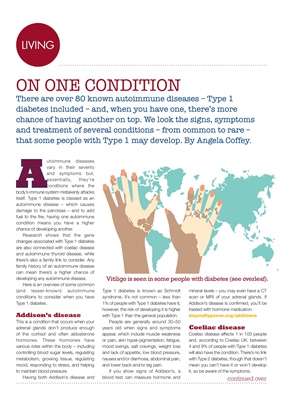
LIVINGLIVING
AA
utoimmune diseases
vary in their severity
and symptoms but,
essentially, they're
conditions where the
body's immune system mistakenly attacks
itself. Type 1 diabetes is classed as an
autoimmune disease - which causes
damage to the pancreas - and to add
fuel to the fire, having one autoimmune
condition means you have a higher
chance of developing another.
Research shows that the gene
changes associated with Type 1 diabetes
are also connected with coeliac disease
and autoimmune thyroid disease, while
there's also a family link to consider. Any
family history of an autoimmune disease
can mean there's a higher chance of
developing any autoimmune disease.
Here is an overview of some common
(and lesser-known) autoimmune
conditions to consider when you have
Type 1 diabetes.
Addison's disease
This is a condition that occurs when your
adrenal glands don't produce enough
of the cortisol and often aldosterone
hormones. These hormones have
various roles within the body - including
controlling blood sugar levels, regulating
metabolism, growing tissue, regulating
mood, responding to stress, and helping
to maintain blood pressure.
Having both Addison's disease and
ON ONE CONDITION
There are over 80 known autoimmune diseases - Type 1
diabetes included - and, when you have one, there's more
chance of having another on top. We look the signs, symptoms
and treatment of several conditions - from common to rare -
that some people with Type 1 may develop. By Angela Coffey.
Type 1 diabetes is known as Schmidt
syndrome. It's not common - less than
1% of people with Type 1 diabetes have it;
however, the risk of developing it is higher
with Type 1 than the general population.
People are generally around 30-50
years old when signs and symptoms
appear, which include muscle weakness
or pain, skin hyper-pigmentation, fatigue,
mood swings, salt cravings, weight loss
and lack of appetite, low blood pressure,
nausea and/or diarrhoea, abdominal pain,
and lower back and/or leg pain.
If you show signs of Addison's, a
blood test can measure hormone and
mineral levels - you may even have a CT
scan or MRI of your adrenal glands. If
Addison's disease is confirmed, you'll be
treated with hormone medication.
beyondtypeone.org/addisions
Coeliac disease
Coeliac disease affects 1 in 100 people
and, according to Coeliac UK, between
4 and 9% of people with Type 1 diabetes
will also have the condition. There's no link
with Type 2 diabetes, though that doesn't
mean you can't have it or won't develop
it, so be aware of the symptoms.
continued over
Vitiligo is seen in some people with diabetes (see overleaf).